 Yes, we're still working on Election 2014 around here. As we've told you many times, problems in elections often take days, weeks or even months or years to reveal themselves, even after the mainstream media has long since moved on.
Yes, we're still working on Election 2014 around here. As we've told you many times, problems in elections often take days, weeks or even months or years to reveal themselves, even after the mainstream media has long since moved on.
Last week we told you about the "recount" that awaits the GMO labeling ballot initiative in the state of Oregon and the amazing appearance of 21 "new" mystery ballots that flipped the results of a state Senate recount in Maine. And now, a "recount" lies ahead for the one remaining "too close to call" U.S. Congressional election in Arizona's 2nd Congressional District.
The state's first-ever "recount" of a Congressional race will be very different from the one that will be carried out for Oregon's Measure 92 and --- as demonstrated via a federal court ruling issued on Thanksgiving Day that disallowed the tally of some 133 provisional and early ballots before today's state certification of the race --- much more controversial. We can only hope no mystery ballots appear, as occurred in the still-unexplained contest in Maine.
The razor-thin contest in AZ-2 is between incumbent Rep. Ron Barber (D) and his challenger Martha McSally (R). Out of some 220,000 votes cast in the AZ-2 race --- in Pima and Cochise Counties --- the paper ballot computer tabulators report a margin of "victory" for McSally over Barber of just 161 votes, according to results posted by the Sec. of State.
The U.S. House seat in Arizona's 2nd District was formerly occupied by Rep. Gabby Giffords (D) until she was critically injured in a 2011 mass shooting that killed six and wounded 13 during a public event in Tucson. After Giffords' resignation following the shooting, she was replaced in a special election by Barber, one of her top staffers who was also shot twice himself during the massacre. Barber then went on to defeat McSally in the 2012 general election by less than one percent.
Prior to today's certification of this year's rematch, there were a number of oddities and controversies during the tabulation period. Among the problems, the reported Election Night failure of the paper ballot optical-scan computer tabulators in Cochise County to read a number of memory cards from the Early Voting period. Those sensitive cards store results of precinct-scanned paper ballots. They had to be flown by helicopter to another county before their contents could be discerned (even though paper ballots existed that could have simply been counted by human beings, rather than relying on electronic tallying systems.)
In addition to the troubling ruling last week by the U.S. District Court and the flawed electronic tabulation of some early ballots, local election integrity experts are also concerned about the state mandated process for "recounting" the ballots, a process which includes using the same flawed electronic scanners once again to determine if the initial scan was carried out accurately...


 The GOP 'Voter Fraud'
The GOP 'Voter Fraud' 'Green News Report' 10/31/24
'Green News Report' 10/31/24
 'Closing Arguments'
'Closing Arguments' Trump Promises to be a Lawless, Authoritarian President. Believe Him: 'BradCast' 10/29/24
Trump Promises to be a Lawless, Authoritarian President. Believe Him: 'BradCast' 10/29/24 'Green News Report' 10/29/24
'Green News Report' 10/29/24 Election Heats Up: Ballots Burn, Billionaires 'Obey in Advance', Callers Ring In: 'BradCast' 10/28/24
Election Heats Up: Ballots Burn, Billionaires 'Obey in Advance', Callers Ring In: 'BradCast' 10/28/24 Musk's Privatized Internet Satellite System Threatens U.S. National Security
Musk's Privatized Internet Satellite System Threatens U.S. National Security Sunday 'VOTE NOW!' Toons
Sunday 'VOTE NOW!' Toons Harris on Hope, Trump's Fasc-ism in Bumpy Closing Days: 'BradCast' 10/24/24
Harris on Hope, Trump's Fasc-ism in Bumpy Closing Days: 'BradCast' 10/24/24 'Green News Report' 10/24/24
'Green News Report' 10/24/24 Kelly on Trump: 'Fascist', Admires Hitler, Disrespects Constitution and Disabled Vets: 'BradCast' 10/23/24
Kelly on Trump: 'Fascist', Admires Hitler, Disrespects Constitution and Disabled Vets: 'BradCast' 10/23/24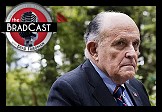 Accountability Comes For Rudy, Other Election Deniers: 'BradCast' 10/22/24
Accountability Comes For Rudy, Other Election Deniers: 'BradCast' 10/22/24 'Green News Report' 10/22/24
'Green News Report' 10/22/24 Elon Musk's 'Vote Buying' and Lying for Trump: 'BradCast' 10/21/24
Elon Musk's 'Vote Buying' and Lying for Trump: 'BradCast' 10/21/24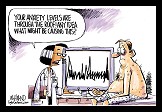 Sunday 'High Anxiety' Toons
Sunday 'High Anxiety' Toons 'Green News Report' 10/17/24
'Green News Report' 10/17/24 Fake v. Real Censorship and Trump/Fox Fetish-ized Grievance World: 'BradCast' 10/17/24
Fake v. Real Censorship and Trump/Fox Fetish-ized Grievance World: 'BradCast' 10/17/24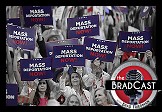 'Americans Aren't Prepared for Trump's Police State': 'BradCast' 10/16/24
'Americans Aren't Prepared for Trump's Police State': 'BradCast' 10/16/24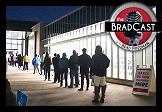 Good News for Georgia Voters, the Economy and Kamala Harris: 'BradCast' 10/15/24
Good News for Georgia Voters, the Economy and Kamala Harris: 'BradCast' 10/15/24 Fascism Comes to America: 'BradCast' 10/14/24
Fascism Comes to America: 'BradCast' 10/14/24 Institutional Landlords Flood CA Voters With Deceptive Ads on Props 33 and 34
Institutional Landlords Flood CA Voters With Deceptive Ads on Props 33 and 34 Milton's Mess, FL's U.S. House Liars, Trump's Made-in-China Bibles: 'BradCast' 10/10/24
Milton's Mess, FL's U.S. House Liars, Trump's Made-in-China Bibles: 'BradCast' 10/10/24 Whistleblower Org Readies to Support Election Officials: 'BradCast' 10/9/24
Whistleblower Org Readies to Support Election Officials: 'BradCast' 10/9/24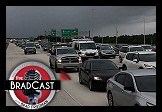 Florida Braces for 'Devastating to Catastrophic' Milton: 'BradCast' 10/8/24
Florida Braces for 'Devastating to Catastrophic' Milton: 'BradCast' 10/8/24
 VA GOP VOTER REG FRAUDSTER OFF HOOK
VA GOP VOTER REG FRAUDSTER OFF HOOK Criminal GOP Voter Registration Fraud Probe Expanding in VA
Criminal GOP Voter Registration Fraud Probe Expanding in VA DOJ PROBE SOUGHT AFTER VA ARREST
DOJ PROBE SOUGHT AFTER VA ARREST Arrest in VA: GOP Voter Reg Scandal Widens
Arrest in VA: GOP Voter Reg Scandal Widens ALL TOGETHER: ROVE, SPROUL, KOCHS, RNC
ALL TOGETHER: ROVE, SPROUL, KOCHS, RNC LATimes: RNC's 'Fired' Sproul Working for Repubs in 'as Many as 30 States'
LATimes: RNC's 'Fired' Sproul Working for Repubs in 'as Many as 30 States' 'Fired' Sproul Group 'Cloned', Still Working for Republicans in At Least 10 States
'Fired' Sproul Group 'Cloned', Still Working for Republicans in At Least 10 States FINALLY: FOX ON GOP REG FRAUD SCANDAL
FINALLY: FOX ON GOP REG FRAUD SCANDAL COLORADO FOLLOWS FLORIDA WITH GOP CRIMINAL INVESTIGATION
COLORADO FOLLOWS FLORIDA WITH GOP CRIMINAL INVESTIGATION CRIMINAL PROBE LAUNCHED INTO GOP VOTER REGISTRATION FRAUD SCANDAL IN FL
CRIMINAL PROBE LAUNCHED INTO GOP VOTER REGISTRATION FRAUD SCANDAL IN FL Brad Breaks PA Photo ID & GOP Registration Fraud Scandal News on Hartmann TV
Brad Breaks PA Photo ID & GOP Registration Fraud Scandal News on Hartmann TV  CAUGHT ON TAPE: COORDINATED NATIONWIDE GOP VOTER REG SCAM
CAUGHT ON TAPE: COORDINATED NATIONWIDE GOP VOTER REG SCAM CRIMINAL ELECTION FRAUD COMPLAINT FILED AGAINST GOP 'FRAUD' FIRM
CRIMINAL ELECTION FRAUD COMPLAINT FILED AGAINST GOP 'FRAUD' FIRM RICK SCOTT GETS ROLLED IN GOP REGISTRATION FRAUD SCANDAL
RICK SCOTT GETS ROLLED IN GOP REGISTRATION FRAUD SCANDAL VIDEO: Brad Breaks GOP Reg Fraud Scandal on Hartmann TV
VIDEO: Brad Breaks GOP Reg Fraud Scandal on Hartmann TV RNC FIRES NATIONAL VOTER REGISTRATION FIRM FOR FRAUD
RNC FIRES NATIONAL VOTER REGISTRATION FIRM FOR FRAUD EXCLUSIVE: Intvw w/ FL Official Who First Discovered GOP Reg Fraud
EXCLUSIVE: Intvw w/ FL Official Who First Discovered GOP Reg Fraud GOP REGISTRATION FRAUD FOUND IN FL
GOP REGISTRATION FRAUD FOUND IN FL



















 I had hoped to keep this week's Thanksgiving
I had hoped to keep this week's Thanksgiving  An election fraud mystery has emerged in Maine's tiny
An election fraud mystery has emerged in Maine's tiny 








 The November 4, 2014 elections are not over in several parts of the country. One of those places is Oregon, where progressive candidates and ballot measures were largely successful in bucking the rightward trend of election results produced by much of the rest of the nation. Nonetheless, a GMO-related ballot measure requiring the labeling of genetically modified foods appeared to have failed on Election Night in the wake of a record amount of campaign cash spent by food manufacturers to defeat it.
The November 4, 2014 elections are not over in several parts of the country. One of those places is Oregon, where progressive candidates and ballot measures were largely successful in bucking the rightward trend of election results produced by much of the rest of the nation. Nonetheless, a GMO-related ballot measure requiring the labeling of genetically modified foods appeared to have failed on Election Night in the wake of a record amount of campaign cash spent by food manufacturers to defeat it. It's investigative Election Integrity muckraking in East Coast/West Coast stereo!
It's investigative Election Integrity muckraking in East Coast/West Coast stereo! Well, I've been remiss over the years since 2012 in covering the BENGHAZI!!! "scandal" on these pages.
Well, I've been remiss over the years since 2012 in covering the BENGHAZI!!! "scandal" on these pages.



 A
A  Well,
Well,  On Friday, one day after the U.S. Department of Justice (DoJ) filed a
On Friday, one day after the U.S. Department of Justice (DoJ) filed a 














